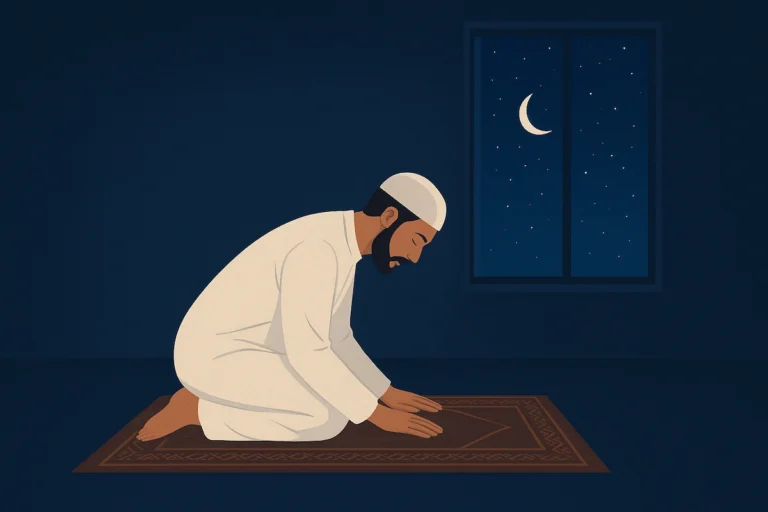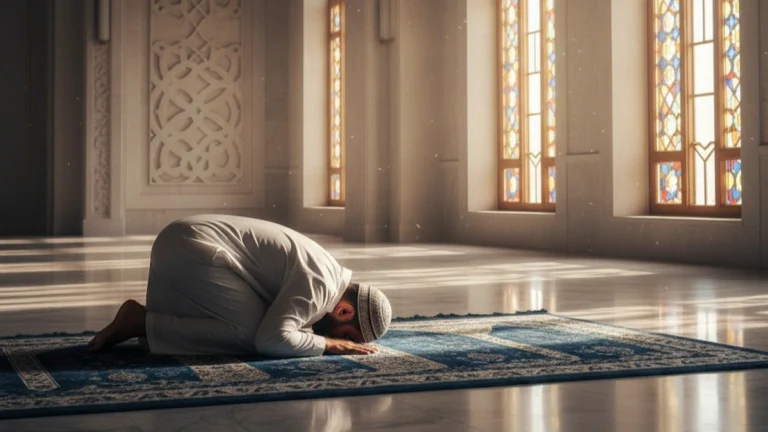A Introduction of Salah (Namaz/Prayer) in Islam
Salah (Namaz/Prayer) stands as an indispensable cornerstone of the Islamic faith and is universally recognized as the second of the five pillars of Islam, immediately following the Shahadah (the declaration of faith). It is far more than a mere religious obligation; it is a profound and direct channel of communication and connection with Allah (SWT), the Almighty Creator.
The obligatory five daily prayers are meticulously prescribed acts of worship, forming the daily rhythm of a Muslim’s life. This constant engagement with the divine serves as a crucial spiritual anchor:
- A Reminder of Purpose: Salah provides five moments throughout the day to pause the distractions of worldly life, reflect on our ultimate purpose, and realign our priorities with the will of Allah (SWT).
- A Source of Purification: It is a means of spiritual cleansing, acting as an atonement for minor sins committed between prayers, helping to keep the heart pure and the conscience clear.
- A Strengthener of Faith: The discipline, humility, and submission embodied in the postures—standing, bowing (Ruku), and prostrating (Sujood)—deeply strengthen one’s Iman (faith) and reliance on God.
The immense importance of Salah is unequivocally highlighted in the teachings of the Prophet Muhammad (ﷺ). He said:
The first thing a person will be asked about on the Day of Judgment is Salah. If it is sound, then the rest of his deeds will be sound.
(Al-Tabarani)
This hadith powerfully underscores that Salah is the litmus test for all of a person’s deeds; its soundness determines the overall integrity of their spiritual life. Neglecting Salah is therefore seen as an abandonment of the foundational commitment to Islam.
Meaning of Salah in Islam
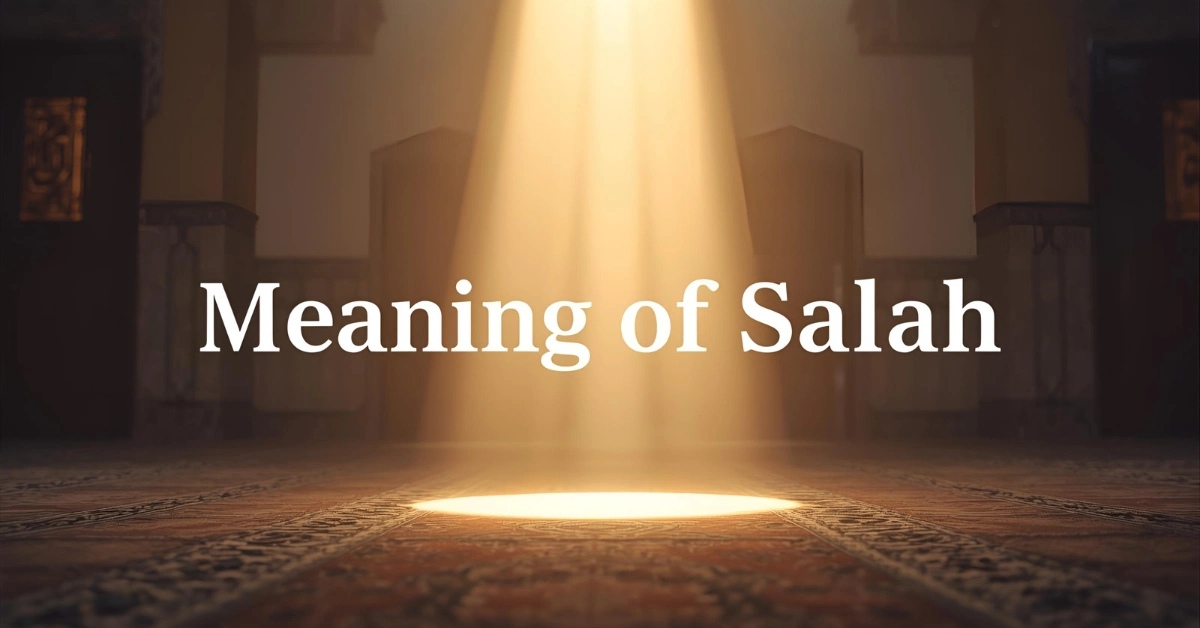
The Arabic word for prayer, Ṣalāh (الصلاة), is rooted in the meaning of ‘connection,’ ‘link,’ or ‘communication.’ This linguistic origin is profoundly significant in Islam, as it defines the very purpose of the act: Salah is the direct link established by the servant between themselves and their Creator, Allah (SWT).
It suggests a deep, spiritual bond, implying that through Salah, the believer is pulled closer to the Divine, establishing a regular, disciplined channel of communication that sustains the soul.
The Islamic (Shar’i) Definition: A Prescribed Act of Worship
In Islamic jurisprudence, Salah is formally defined as:
“The structured act of worshipping Allah (SWT) through a specific series of established words (recitations) and actions (postures), performed at prescribed times, which begins with the Takbir (saying ‘Allahu Akbar’) and concludes with the Tasleem (saying ‘Assalamu Alaikum’).”
This definition highlights several key elements that transform simple supplication (Du’a) into the mandatory ritual of Salah:
- A Complete Submission: Salah is an integrated act where the heart, mind, and body all participate. The recitations (from the Qur’an) and supplications (Du’a) engage the mind and tongue, while the postures—standing, bowing (Ruku), and prostrating (Sujood)—engage the body.
- Ritual Purity is Essential: The act is bound by conditions of purity, most notably performing Wudu (ablution) beforehand. This ensures that the worshipper is not only mentally and spiritually prepared but also physically clean before standing before Allah.
- Facing the Qiblah: Every Salah must be performed while facing the Ka’bah in Makkah (the Qiblah). This unified direction ensures unity among Muslims worldwide, reinforcing the sense of a global community (Ummah) worshipping the One God.
- A Formal Framework: The precise beginning (with the Takbiratul Ihram—the opening ‘Allahu Akbar’) and the exact ending (with the Tasleem) signify that the worshipper formally enters and exits a state of focused worship. During this time, all worldly talk and distraction must cease, making the prayer a sanctuary for connecting with God.
In essence, Salah is the divinely mandated daily appointment that a Muslim keeps with their Lord, serving as the essential rhythm and structure of their spiritual life.
The Prophet Muhammad (ﷺ) personally demonstrated the method of performing the prayer (Salah) and instructed the community (Ummah):
صَلُّوا كَمَا رَأَيْتُمُونِي أُصَلِّي
Pray as you have seen me praying.
(Sahih al-Bukhari, Hadith 631)
مِفْتَاحُ الصَّلاةِ الطُّهُورُ، وَتَحْرِيمُهَا التَّكْبِيرُ، وَتَحْلِيلُهَا التَّسْلِيمُ
The key to the prayer (Salah) is purification (Wudu), its commencement (Tahrīm) is the Takbir (saying ‘Allahu Akbar’), and its completion (Taḥlīl) is the Tasleem (saying the Salam).
(Sunan al-Tirmidhi, Hadith 3) and (Sunan Abi Dawud, Hadith 61)
The Paramount Importance of Salah (Prayer) in Islam
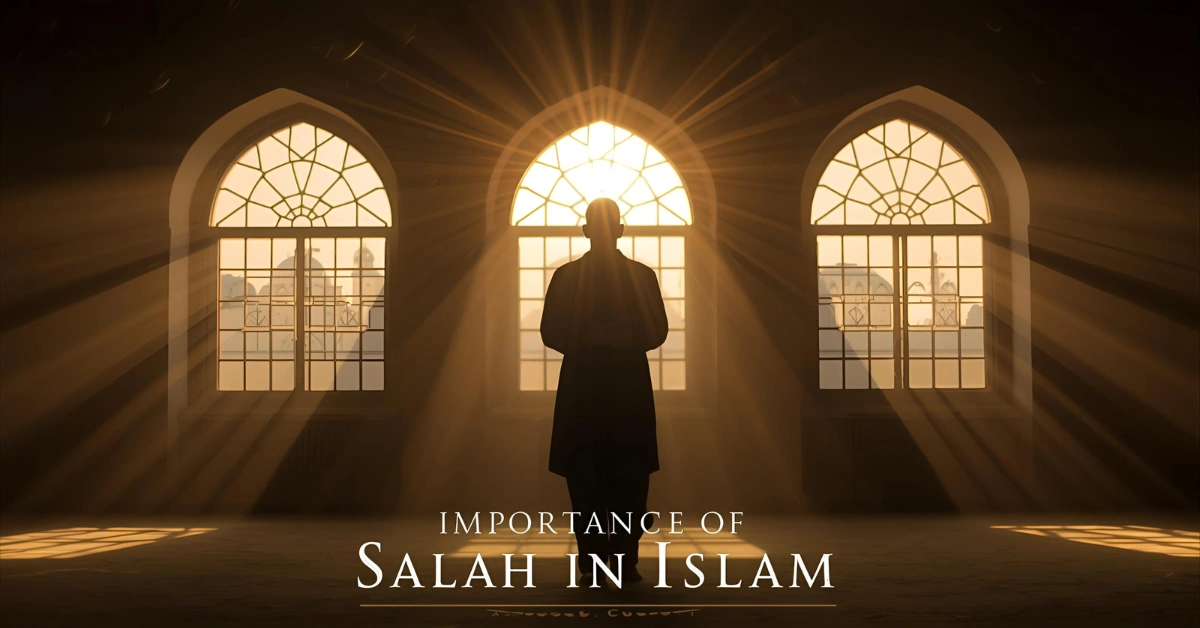
Salah (formal prayer) is the cornerstone of a Muslim’s faith, serving as the most fundamental and consistent act of worship. Its importance is underscored by its position as the first ritual obligation commanded by God.
1. The Second Pillar of Islam: The Anchor of Faith
Salah is firmly established as the Second Pillar of Islam, right after the declaration of faith (Shahadah). This placement highlights its central and critical role in a Muslim’s life.
- Universal Obligation: It is obligatory (Fard) upon every Muslim—male and female, adult and sane—to perform the five daily prayers at their prescribed times. The command to establish prayer is repeated frequently throughout the Quran, signaling its non-negotiable status.
- The First Accountability: It is often emphasized that Salah will be the first thing a person is questioned about on the Day of Judgment. If one’s prayer is found sound, the rest of their deeds are likely to follow suit.
2. A Barrier Against Sin and Evil
One of the greatest benefits of Salah is its profound impact on a person’s moral character, acting as a spiritual safeguard.
- Moral Filter: The Quran explicitly states that the consistent performance of Salah actively cleanses the soul and prevents the believer from engaging in wrongdoing:
إِنَّ الصَّلَاةَ تَنْهَىٰ عَنِ الْفَحْشَاءِ وَالْمُنكَرِ
Indeed, the Prayer keeps away from shameful and evil deeds.
(Qur’an 29:45)
The logic is simple: By pausing five times a day to stand before God, a person maintains a constant state of God-consciousness (Taqwa), making them less likely to commit a sin right before or right after addressing their Creator.
- A Daily Cleansing: The Prophet Muhammad (
ﷺ) compared the five daily prayers to a flowing river at one’s doorstep, where bathing five times a day leaves no dirt behind, wiping away minor sins.
3. Profound Spiritual and Psychological Benefits
Salah provides sustenance and peace for the soul, connecting the human being directly to the Divine source of comfort.
- Spiritual Connection (Mi’raj): Salah is often described as the Mi’raj (ascension) of the believer, offering a direct, unmediated communication with Allah (SWT).
- Source of Peace: The Prophet Muhammad (ﷺ
) sought relief and comfort in prayer, saying: “The delight of my eyes has been made in the prayer.” This shows that Salah is a source of peace (Sakīnah) and tranquility, offering a pause from the stress and turmoil of worldly life.
- Closeness in Prostration: The posture of Sujood (prostration) is considered the peak of devotion. The Prophet (
ﷺ) said: “A slave becomes nearest to his Lord when he is in a state of prostration. So increase your supplications then.” (Sahih Muslim)
4. Physical and Mental Wellness
While the primary purpose is worship, the structured movements and timing of Salah offer tangible physical and mental health advantages:
- Improved Posture and Flexibility: The sequence of standing (Qiyam), bowing (Ruku), and prostrating (Sujood) is a gentle form of low-impact exercise that stretches muscles, improves joint flexibility, and maintains good body posture.
- Enhanced Circulation: The Sujood posture, where the head is placed below the heart, is known to temporarily increase blood flow to the brain, improving concentration and mental acuity.
- Mental Relaxation: The rhythmic, repetitive nature of the prayer, combined with deep breathing and focused recitation, acts as a form of mindful meditation, reducing stress and promoting mental relaxation.
In summary, Salah is not merely a ritual duty; it is the comprehensive system designed to build discipline, maintain moral character, and sustain the spiritual health of the believer throughout their life.
Types of Salah in Islam (Islamic Prayer)
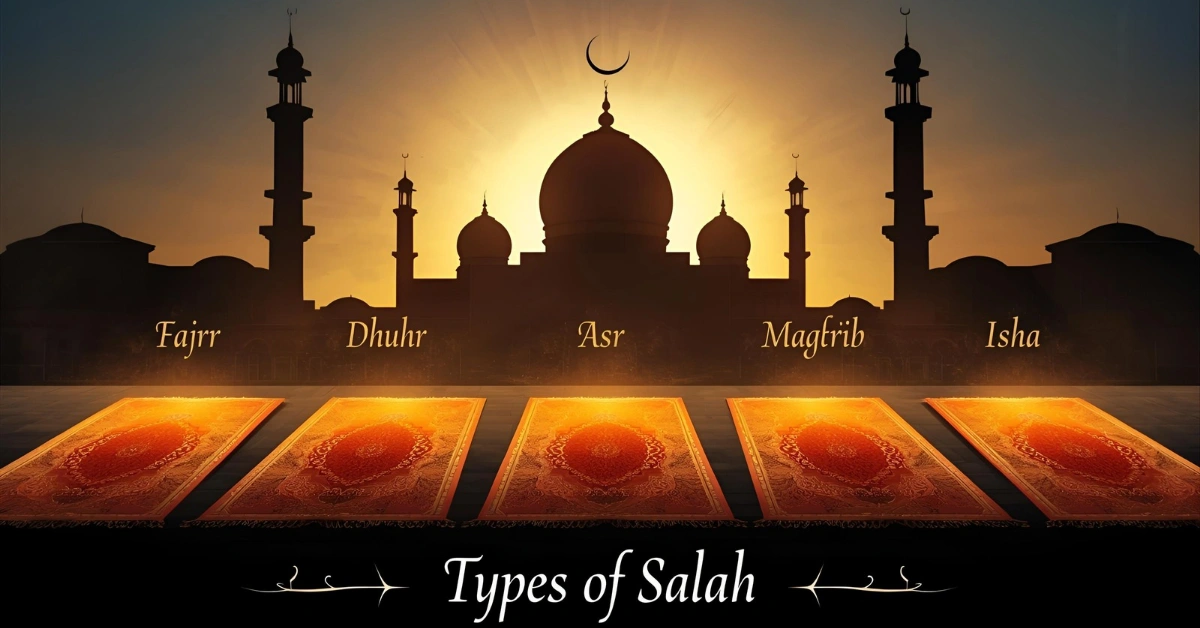
The various forms of Salah help Muslims maintain a consistent and deep connection with Allah (SWT) through different levels of commitment and spiritual striving.
1. Fard (Obligatory Salah)
Fard refers to actions explicitly commanded by Allah (SWT). These prayers are mandatory upon every adult, sane Muslim (male and female). Neglecting a Fard prayer without a valid excuse is considered a major sin.
| Prayer Name | Time | Rak’ahs (Units) | Description |
| Fajr | Just before sunrise (Dawn) | 2 | Marks the start of the day and requires great discipline. |
| Dhuhr | Midday, after the sun passes its zenith | 4 | The primary prayer of the workday. |
| Asr | Late afternoon, before sunset | 4 | Often referred to as the ‘middle prayer’ (mentioned in the Quran), essential for maintaining faith throughout the busy part of the day. |
| Maghrib | Immediately after sunset | 3 | The shortest of the Fard prayers, marking the end of the day. |
| Isha | Nighttime, before midnight | 4 | The final, calming prayer before sleep. |
2. Sunnah Salah (Recommended & Established Prayers)
Sunnah prayers are those which the Prophet Muhammad (ﷺ) regularly performed, encouraged, or taught. They serve to perfect the compulsory prayers and earn significant reward.
| Sunnah Type | Description | Examples |
| Sunnah Mu’akkadah (Emphasized) | Prayers the Prophet ( | The 2 Rak’ahs before Fajr, and the 4 or 2 Rak’ahs before and after Dhuhr. |
| Sunnah Ghair Mu’akkadah (Non-Emphasized) | Prayers the Prophet (ﷺ | 4 Rak’ahs before Asr and 4 Rak’ahs before Isha. |
- Key Examples:
- Tahajjud: An excellent voluntary night prayer performed after waking from sleep (ideally in the last third of the night). It is highly encouraged for spiritual growth.
- Ishraq/Duha: Prayers performed after sunrise (Ishraq) and later in the morning (Duha), often referred to as the ‘forenoon prayer,’ bringing abundant reward.
3. Nafl (Voluntary Salah)
Nafl refers to optional, supererogatory prayers that are not specifically tied to the five daily prayers or emphasized by the Prophet (ﷺ).
- Purpose: They are performed purely to seek extra reward (thawab), gain greater closeness to Allah, and supplicate for specific needs.
- Examples:
- Salat al-Istikhara: A prayer of seeking guidance when making an important decision.
- Salat al-Tawbah: A prayer performed when seeking repentance for sins.
- Any spontaneous two Rak’ahs performed outside of the prohibited times.
4. Witr Salah (The Odd-Numbered Prayer)
Witr means “odd” and is a prayer performed after the Isha prayer.
- Structure: It consists of an odd number of Rak’ahs (usually 1, 3, 5, 7, etc.).
- Ruling: Scholars differ on its exact status; many schools of thought (like the Hanafi school) regard it as Wajib (compulsory/necessary), making it slightly less obligatory than Fard but more emphasized than Sunnah Mu’akkadah. It is the final prayer of the night.
5. Janazah Salah (Funeral Prayer)
Janazah Salah is the specific prayer offered for a deceased Muslim. It is structurally unique.
- Structure: It is performed while standing, consists of four Takbirs (Allahu Akbar), and involves no bowing (Ruku) or prostration (Sujood). It consists entirely of praising Allah and supplicating for the deceased.
- Ruling: It is Fard Kifayah (Communal Obligation). If a sufficient number of people in the community perform it, the obligation is lifted from all others. However, if no one performs it, the entire community is held responsible.
These various types of Salah ensure that a Muslim’s entire day—from before dawn until night—is integrated with remembrance of and submission to Allah.
Conditions of Salah in Islam (Shuroot al-Salah)
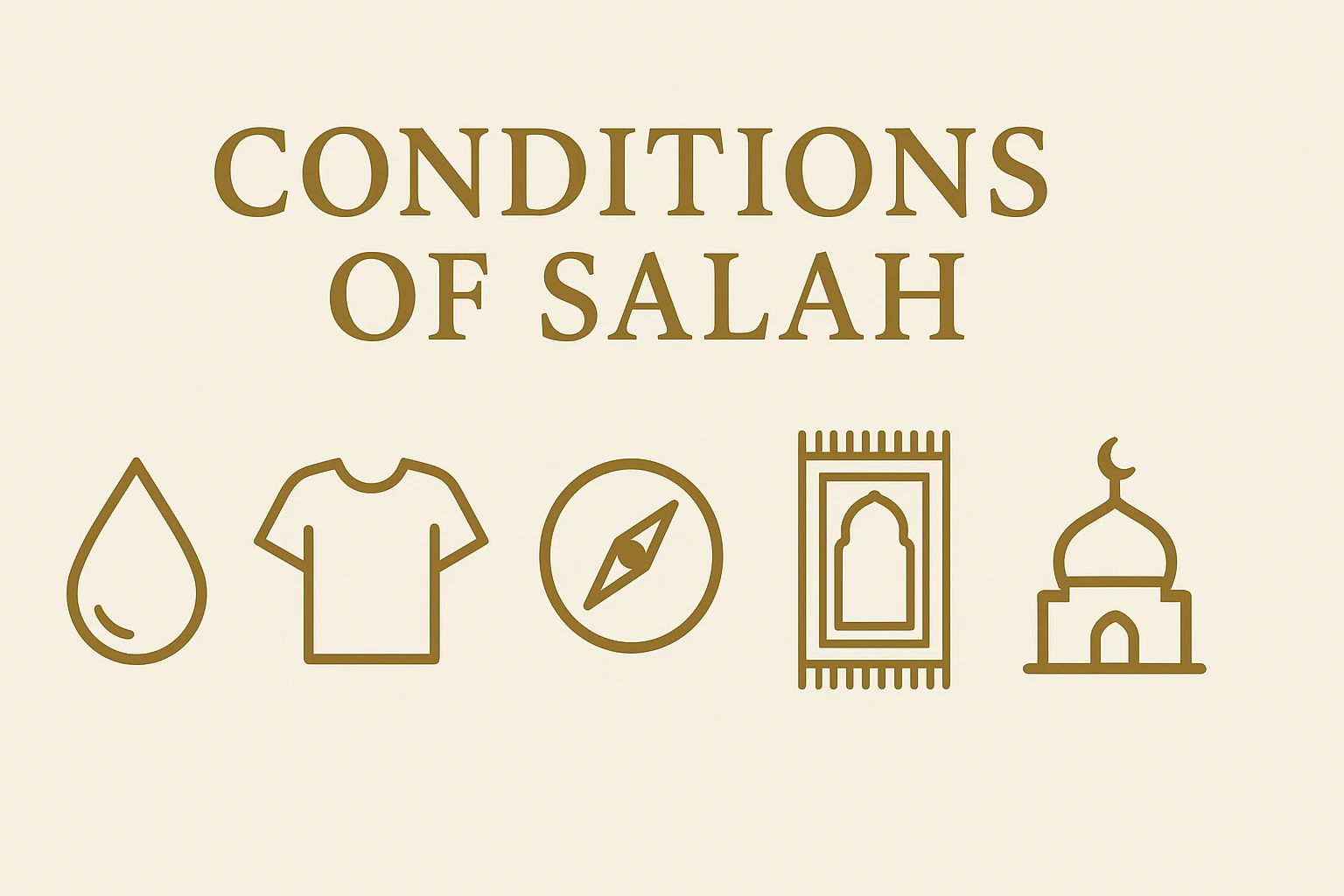
These are the essential pre-requisites that a Muslim must meet for their prayer to be considered legally valid. If any of these conditions are missing, the Salah is generally considered void.
1. Purity (Taharah)
Purity is the most critical condition, required for the body, clothes, and the place of prayer.
- Purity of Body (from impurity): This involves removing ritual impurity through:
- Purity of Clothing and Place: The worshipper’s clothes and the spot where the prayer is offered must be free from all filth (Najāsa), such as urine, blood, or feces.
2. Covering the ‘Awrah (Sitr al-‘Awrah)
The ‘Awrah refers to the parts of the body that must be covered during Salah (and generally in public). The clothing must be clean, loose, and non-transparent.
- For Men: The area from the navel to the knees must be covered.
- For Women: The entire body must be covered, with the exception of the face and hands.
3. Entry of the Correct Time (Waqt)
Every one of the five obligatory prayers has a specific, fixed time window, determined by the position of the sun.
- A prayer performed before its time has entered is invalid.
- A prayer must be offered within its time. Intentionally delaying a prayer until its time has passed (Qada’) is a serious sin.
4. Facing the Qiblah
The worshipper must face the Ka‘bah in Makkah, which is the universal direction of prayer for all Muslims worldwide.
- This condition fosters unity among the global Muslim community (Ummah).
- If one is traveling or in a place where the direction is unknown, they must make their best effort to determine the Qiblah.
5. Niyyah (Intention)
Niyyah is the internal, heartfelt intention to perform a specific prayer.
- It is a mental determination to perform the specific obligation (e.g., the four units of the Fard Dhuhr prayer).
- The Niyyah is situated in the heart and does not necessarily need to be verbalized, though it is usually made right before or while beginning the opening Takbir.
Once all these conditions are met, the Muslim can begin the prayer itself by proclaiming the Takbīrat al-Iḥrām (“Allahu Akbar”).
Step-by-Step Guide: How to Perform Salah in Islam
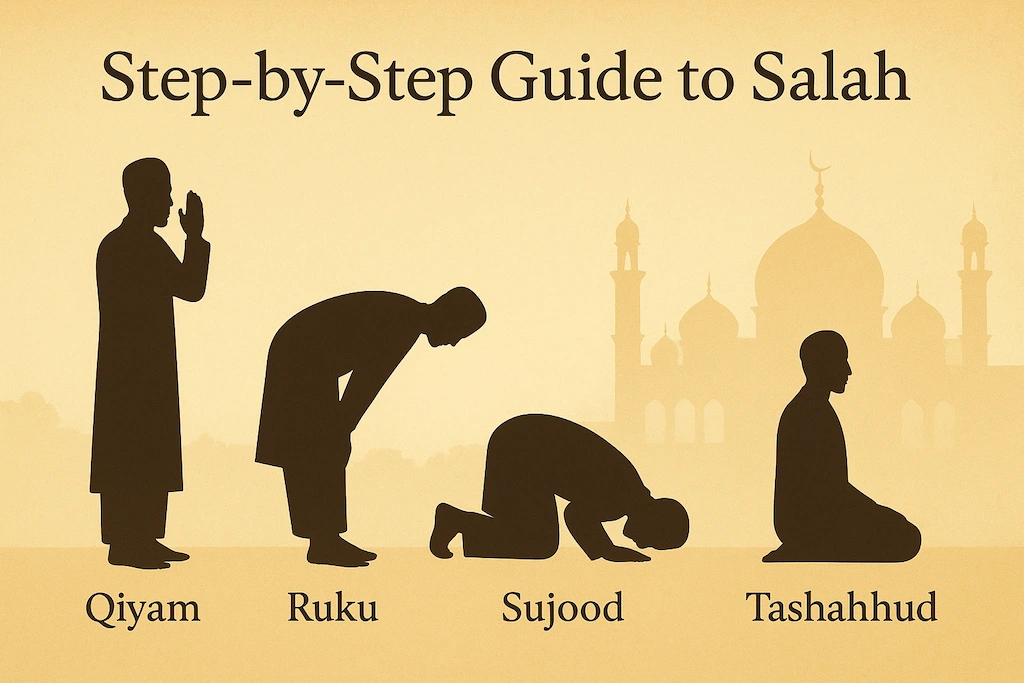
This process is broken down into the Arkān (Pillars)—the essential acts—and the Wājibāt (Necessary Acts) that make up each unit of prayer.
1. Niyyah (Intention)
- Action: Before raising your hands, make the firm intention in your heart as to which prayer you are about to perform (e.g., “I intend to perform two rak’ahs of the Fard Fajr prayer for Allah”).
- Focus: The intention is a mental determination and does not need to be spoken aloud.
2. Takbir al-Ihram (The Opening Command)
- Action: Raise both hands (palms facing the Qiblah) to the level of your ears (for men) or shoulders (for women).
- Recitation: Say: Allahu Akbar (اللّٰهُ أَكْبَرُ).
- Significance: This proclamation marks your entry into the sacred state of prayer, making all worldly conversation and actions forbidden (haram).
3. Qiyam (Standing & Recitation)
After the opening Takbir, place your right hand over your left hand on your chest or below the navel (depending on the school of thought).
- Thana (Opening Supplication): Recite a short prayer silently (e.g., Subhanaka Allahumma…).
- Ta’awwudh: Recite: A’udhu billahi minash-shaytanir-rajim (I seek refuge in Allah from the accursed Shaytan).
- Surah Al-Fatihah: Recite Surah Al-Fatihah (the opening chapter of the Qur’an) completely. This is a pillar of Salah.
- Second Surah: Recite another short Surah or a few verses from the Qur’an (e.g., Surah Ikhlas, Falaq, Nas, etc.).
4. Ruku (Bowing)
- Action: Say Allahu Akbar and bend forward, keeping your back straight and parallel to the ground. Place your hands firmly on your knees, with fingers spread apart.
- Recitation: Say three (or more) times: Subhana Rabbiyal ‘Azim (سُبْحَانَ رَبِّيَ الْعَظِيمِ) – “Glory be to my Lord, the Almighty.”
5. Qaumah (Standing after Ruku’)
- Action: Rise completely straight up from the Ruku position.
- Recitation: While rising, say: Sami‘ Allahu liman hamidah (سَمِعَ اللّٰهُ لِمَنْ حَمِدَهُ) – “Allah hears the one who praises Him.”
- Recitation: Once standing straight, say: Rabbana lakal-hamd (رَبَّنَا لَكَ الْحَمْدُ) – “Our Lord, to You is all praise.”
6. Sujood (Prostration)
- Action: Say Allahu Akbar and go down into prostration. Seven parts of the body must touch the ground: the forehead, nose, both palms, both knees, and the toes of both feet.
- Recitation: Say three (or more) times: Subhana Rabbiyal A‘la (سُبْحَانَ رَبِّيَ الأَعْلَى) – “Glory be to my Lord, the Most High.”
7. Jalsa (Sitting between two Sujood)
- Action: Say Allahu Akbar and raise your head and body to sit up straight and momentarily still. Place your hands on your thighs.
- Recitation: Supplicate: Rabbighfir li, Rabbighfir li (رَبِّ اغْفِرْ لِي، رَبِّ اغْفِرْ لِي) – “My Lord, forgive me, my Lord, forgive me.”
8. Second Sujood (Prostration)
- Action: Say Allahu Akbar and perform the second prostration exactly as you did the first.
- Recitation: Say three (or more) times: Subhana Rabbiyal A‘la.
- End of Rak’ah 1: After raising your head from the second Sujood, you have completed one rak’ah. You then stand up saying Allahu Akbar to begin the second rak’ah (or sit for Tashahhud if it’s the second rak’ah).
9. Tashahhud (Sitting for Testimony)
This stage occurs at the end of the second rak’ah and the final rak’ah of any prayer.
- Action: Sit down after the second Sujood.
- Recitation (Every Tashahhud): Recite the Attahiyyatu (Attahiyyatu lillahi…).
- Recitation (Last Rak’ah Only): In the final sitting of any prayer (3- or 4-unit prayer):
- Recite the Attahiyyatu.
- Recite Durood Ibrahim (the prayer upon the Prophet
).
- Make a personal Du’a (supplication) using the prayers taught in the Qur’an or Sunnah (e.g., Rabbana atina fid-dunya hasanah…).
10. Tasleem (Ending the Prayer)
- Action: This formally concludes the prayer.
- Recitation (Right): Turn your head to the right and say: Assalamu Alaikum wa Rahmatullah (السَّلَامُ عَلَيْكُمْ وَرَحْمَةُ اللهِ) – “Peace be upon you and the Mercy of Allah.”
- Recitation (Left): Turn your head to the left and say: Assalamu Alaikum wa Rahmatullah.
The Salah is now complete. You should also know the prayer times in detail. Here’s detailed information on when each prayer’s time begins and how long it lasts.
Detailed Times of Salah in Islam (The Five Daily Prayers)
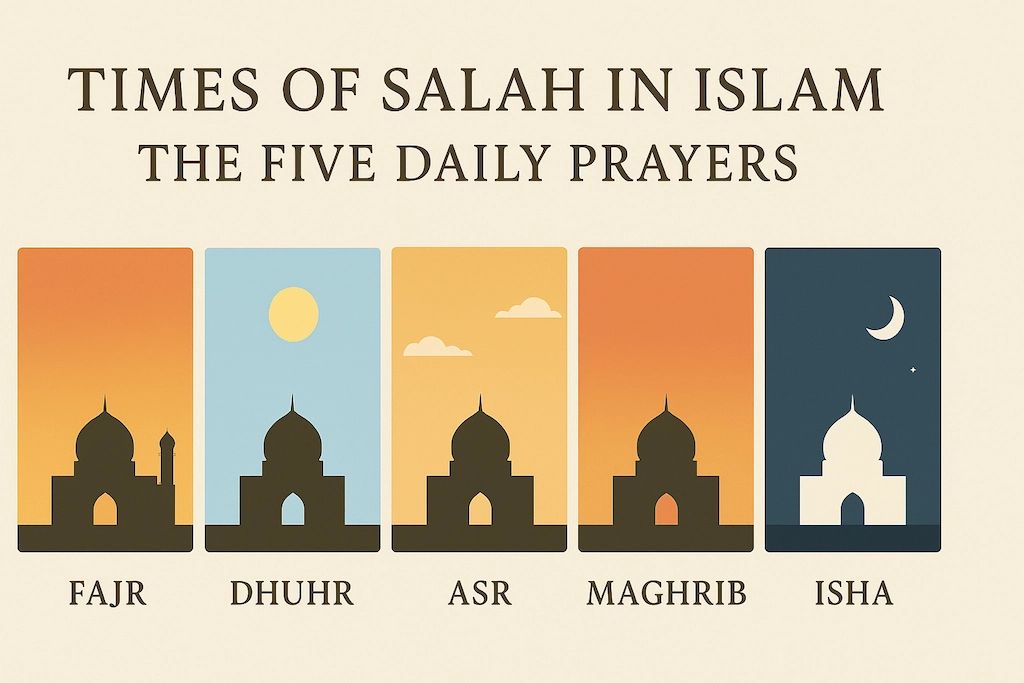
The timing of each prayer is fixed by the position of the sun, making adherence to these windows a fundamental obligation for every Muslim.
1. Fajr (Dawn Prayer)
| Time Period | From Dawn till Sunrise |
| Start Time | The appearance of the True Dawn (Fajr Sadiq): This occurs when a horizontal band of faint white light appears across the eastern horizon. This light spreads laterally and marks the end of the time for the pre-dawn meal (Suhūr). |
| End Time | Just before Sunrise: The moment the top edge of the sun begins to appear above the horizon, the time for Fajr prayer ends. |
| Significance | This prayer is performed in the transition between darkness and light, symbolizing the start of the day with devotion to Allah. |
2. Dhuhr (Midday Prayer)
| Time Period | After Midday (Zenith) until the Shadow Lengthens |
| Start Time | After the sun has passed its zenith (Zawal): The zenith is the highest point the sun reaches in the sky, where an object’s shadow is at its absolute shortest (the fay’ az-zawal). As soon as the sun begins to decline toward the west, Dhuhr time begins. |
| End Time | When an object’s shadow is equal to its length, plus the fay’ az-zawal (the residual shadow at noon). (Note: There is a difference of opinion among schools of thought—the Hanafis prefer the shadow to be twice the object’s length, marking a slightly later Asr start time). |
| Significance | It serves as a spiritual check-in during the busiest part of the working day. |
3. Asr (Late Afternoon Prayer)
| Time Period | Dhuhr End Time until Sunset |
| Start Time | The Dhuhr time ends (and the Asr time begins): When the shadow of an object becomes equal to its own length, excluding the residual shadow at zenith (Zawal). (This is according to the primary view of Imam Abu Hanifa; in other schools of thought, Asr begins slightly earlier). |
| End Time | Just before Sunset: The time lasts until the entire disk of the sun disappears below the horizon. However, it is strongly disliked (Makrūh) to delay Asr until the sun turns yellow or red and is about to set, as this is the time of emergency. |
| Significance | Referred to in the Quran as the “Middle Prayer,” it is essential for concluding the day’s spiritual duties. |
4. Maghrib (Sunset Prayer)
| Time Period | Just after Sunset until the Twilight Disappears |
| Start Time | Immediately after the entire disk of the sun disappears below the horizon (Sunset). The window for Maghrib is the shortest of the five prayers. |
| End Time | When the red twilight (Shafaq al-Ahmar) disappears from the western horizon. This typically lasts between 45 minutes to an hour and a half after sunset, depending on the location and season. |
| Significance | This prayer is performed promptly at the close of the day, offering thanks for the day that has passed. |
5. Isha (Night Prayer)
| Time Period | After Twilight Disappears till the Start of Fajr |
| Start Time | Immediately after the Maghrib time ends: When the red twilight has completely vanished from the sky. |
| End Time | The appearance of the True Dawn (Fajr Sadiq). However, delaying the prayer past midnight (the midpoint between sunset and sunrise) is generally considered undesirable (Makrūh), and it is highly recommended to complete Isha before then. |
| Significance | It is the final mandatory prayer, offering peace and closure to the day before sleep. |
These fixed timings require Muslims to organize their day around these acts of worship, reinforcing discipline and God-consciousness.
Common Mistakes in Salah

The goal of Salah is to achieve communion with Allah (SWT). Avoiding these common errors can significantly enhance the validity and spiritual impact of your prayer.
1. Lack of Concentration (Khushu‘)
Khushu‘ is the spiritual core of Salah—it is the state where the heart, mind, and body are fully present, demonstrating humility and reverence before God.
- The Mistake: Allowing the mind to wander to worldly matters (work, debt, plans, etc.). This makes the body present, but the spirit absent. The Prophet (ﷺ) warned that a person may get only half, a tenth, or even none of the reward for their prayer, depending on their focus.
- The Fix: Focus intensely on the meaning of the Arabic words being recited, and remember that you are in direct conversation with your Creator.
2. Rushing Through Actions (Lack of Tumā’nīnah)
This is a physical error that can invalidate the prayer entirely, as Tumā’nīnah (pausing and settling in each posture) is an essential pillar (Rukn).
- The Mistake: Not pausing long enough in the various postures, particularly Ruku’ (bowing), Qaumah (standing after Ruku’), Sujood (prostration), and Jalsa (sitting between prostrations). People often rush back up before their bones and limbs have settled into stillness.
- The Severity: The Prophet (
ﷺ) called this action “stealing from one’s prayer.” You must pause long enough in each position for the body to become completely still before moving to the next position.
3. Not Reciting Properly (Errors in Qira’at)
The recitation of the Quran is a pillar of Salah, and major errors can compromise the prayer.
- The Mistake:
- Making errors in reciting Surah Al-Fatihah, as reciting it correctly is mandatory in every unit (rak’ah).
- Failing to observe Tajweed rules (the correct pronunciation of Arabic letters), which can sometimes change the meaning of the words.
- The Fix: Take the time to learn the proper pronunciation of the mandatory recitations to ensure your communication with Allah is accurate.
4. Always Neglecting Sunnah Prayers
While Sunnah prayers are not obligatory (Fard), constantly neglecting them leads to spiritual loss.
- The Mistake: Performing only the five Fard prayers and omitting the Sunnah Mu’akkadah (Emphasized Sunnah) prayers (e.g., the two units before Fajr or the Sunnah prayers linked to Dhuhr, Maghrib, and Isha).
- The Importance: Sunnah prayers act as a buffer for the Fard prayers. According to Hadith, on the Day of Judgment, if there are shortcomings in a person’s Fard prayers, Allah will look at their voluntary (Sunnah and Nafl) prayers to make up for the deficiency.
5. Praying at Prohibited Times (Makrūh Times)
There are specific, short periods during the day when voluntary (Nafl or Sunnah) prayers are forbidden to avoid resemblance to sun-worshippers.
- Forbidden Times:
- At Sunrise: From the moment the sun begins to rise until it has fully risen (about 10–15 minutes).
- At Midday (Zenith): The short period when the sun is exactly at its highest point in the sky, just before the Dhuhr time enters.
- At Sunset: When the sun is clearly setting and its disc is disappearing.
- The Rule: If an obligatory (Fard) prayer is missed (Qada’), or if it is the Janazah (Funeral) prayer, it may be performed during these times. Otherwise, wait until the prohibition is lifted.
The Rewards and Significance of Salah in Islam

Salah is not just an obligation; it is a means of achieving immense spiritual reward, protection, and eternal success in the sight of Allah (SWT).
1. Forgiveness of Sins (Kaffārah)
Salah acts as a regular, systemic cleanser for the soul, providing continuous opportunities for repentance and the erasure of minor sins.
- Daily Purification: The Prophet Muhammad (ﷺ
) stated: “The five (daily) prayers, and Friday (prayer) to the Friday (prayer), and Ramadan to Ramadan, are expiations for the sins committed in between them, provided that major sins are avoided.” (Sahih Muslim)
- A Fresh Start: Performing Salah five times a day ensures that a Muslim maintains a state of ritual and spiritual cleanliness, essentially washing away the daily spiritual dust accumulated from minor faults.
2. Protection from Hellfire
By serving as the primary proof of a Muslim’s faith and submission, Salah provides a pathway to safety in the Hereafter.
- The Path to Jannah: Since Salah is the second and most vital Pillar of Islam, its consistent performance secures Allah’s pleasure and the promise of Paradise. In contrast, the Qur’an records the inhabitants of Hell being asked what brought them there, and their response included: “We were not of those who prayed.” (Qur’an 74:43)
- A Continuous Reminder: Salah protects the believer from falling into major sins by fostering constant God-consciousness (Taqwa), thereby acting as a continuous barrier against actions that lead to punishment.
3. Nearness to Allah (SWT)
Salah is the ultimate mechanism for establishing a direct, unmediated bond with the Creator.
- The State of Prostration (Sujood): The moment of prostration is considered the time when a believer is closest to Allah (SWT). The Prophet (ﷺ
) advised:”A slave becomes nearest to his Lord when he is in a state of prostration; so increase your supplications (in it).” (Sahih Muslim)
- The Believer’s Mi’raj: Salah is often called the Mi’raj (Ascension) of the believer, echoing the Prophet’s journey to the heavens, because it raises the worshipper spiritually to communicate directly with God.
4. Entry into Jannah (Paradise)
Regular and sincere performance of Salah is the key characteristic of those who achieve eternal success.
- Ultimate Success: The Qur’an describes the truly successful believers as those who “are keepers of their prayers. Those will be the inheritors [of Paradise], who will inherit al-Firdaus [the highest gardens], where they will abide eternally.” (Qur’an 23:9-11)
- Earning Companionship: When a young companion asked the Prophet (ﷺ
) for his companionship in Paradise, the Prophet replied: “Then help me to achieve this for you by increasing your prostrations [prayers].” (Sahih Muslim)
5. The Difference Between Believer and Non-Believer
In Islam, Salah is so fundamental that it serves as the ultimate test and distinction of genuine commitment to the faith.
- The Decisive Line: The Prophet Muhammad (
ﷺ) explicitly drew the boundary between faith and disbelief with this action: “The covenant between us and them is the prayer; so he who abandons it has disbelieved [or is considered an apostate].” (Sahih Muslim)
- Public Testimony: While the Shahadah (testimony of faith) is internal, Salah is the obligatory public manifestation of that faith, demonstrating true submission to Allah’s command.
The rewards of Salah, therefore, encompass spiritual purification in this life and the guarantee of eternal protection and bliss in the next.
Salah is More Than Just a Duty

Salah is not merely a religious obligation; it is a profound blessing and a gift from Allah (SWT) to the believers. It is the primary means by which a Muslim sustains their faith, character, and relationship with their Creator.
1. Spiritual Anchor and Source of Peace
Salah provides an essential spiritual refuge from the chaos of daily life.
- Heart’s Tranquility: It is the ultimate source of peace (Sakīnah) and discipline. The Prophet Muhammad (
ﷺ) sought solace in prayer, stating that the “delight of my eyes has been made in the prayer,” signifying that Salah provides comfort, refreshment, and serenity to the soul.
- Constant Connection: By requiring the believer to pause five times a day, Salah ensures a constant state of God-consciousness (Taqwa), reminding the individual of their purpose and accountability.
2. A Tool for Discipline and Closeness
The structure and timing of the five daily prayers infuse a believer’s life with unparalleled discipline and moral guidance.
- Discipline: Adhering strictly to the fixed times for Fajr, Dhuhr, Asr, Maghrib, and Isha fosters punctuality, responsibility, and routine—qualities that benefit every aspect of life.
- Protection: The closeness achieved in Salah acts as a moral shield. As the Qur’an states: “Indeed, the Prayer keeps away from shameful and evil deeds.” (Qur’an 29:45)
3. The Divine Command to Guard the Salah
The immense value of Salah is highlighted by Allah’s powerful command not just to perform it, but to actively guard it—ensuring its quality and timeliness.
- The Command:“Guard strictly your Salah, especially the middle prayer (Asr), and stand before Allah with devotion.” (Qur’an 2:238)
- Interpretation: To “guard strictly” means ensuring it is performed:
- On time (within the prescribed window).
- With Khushu‘ (sincerity and devotion).
- With all its conditions and pillars fulfilled.
The special mention of the ‘middle prayer’ (Asr) emphasizes its importance, as it often falls during the busiest part of the day, making its consistent performance a true test of a believer’s commitment.
In conclusion, every Muslim must guard his Salah, pray on time, and perform it with sincerity and devotion, for it is the ultimate differentiator between the believer and the non-believer, and the surest path to Jannah.
All images in this post are not actual photographs. They are digital illustrations created to symbolize the beauty and spirituality of Tahajjud prayer.

